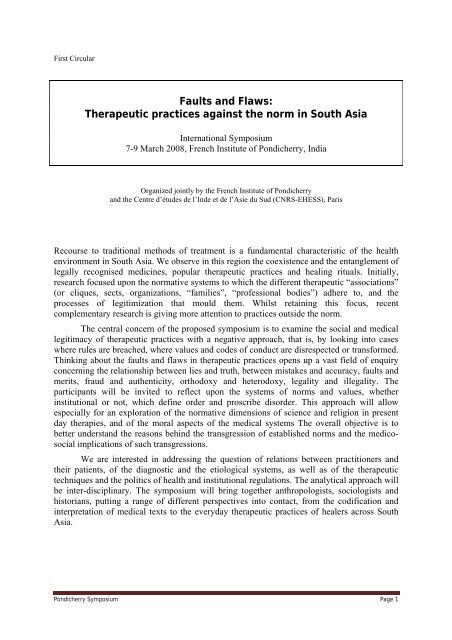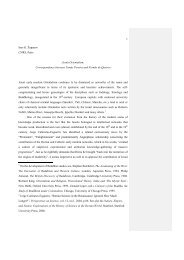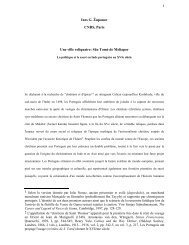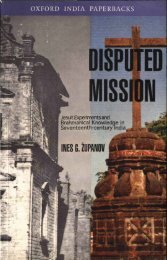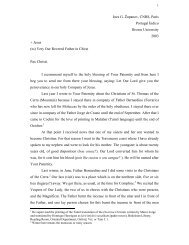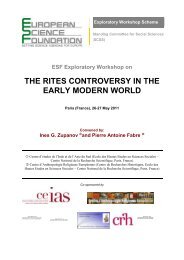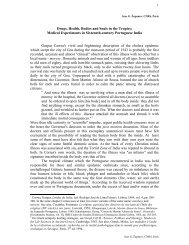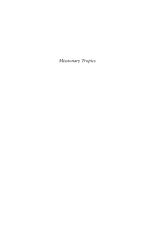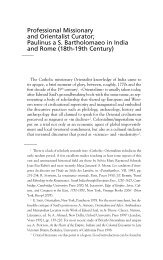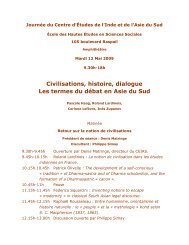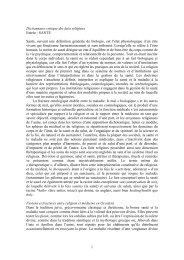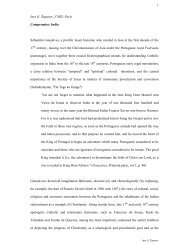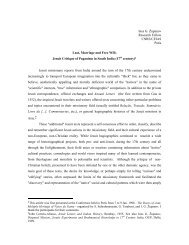DOSSIER SCIENTIFIQUE - Ines G. Županov
DOSSIER SCIENTIFIQUE - Ines G. Županov
DOSSIER SCIENTIFIQUE - Ines G. Županov
Create successful ePaper yourself
Turn your PDF publications into a flip-book with our unique Google optimized e-Paper software.
First Circular<br />
Faults and Flaws:<br />
Therapeutic practices against the norm in South Asia<br />
International Symposium<br />
7-9 March 2008, French Institute of Pondicherry, India<br />
Organized jointly by the French Institute of Pondicherry<br />
and the Centre d’études de l’Inde et de l’Asie du Sud (CNRS-EHESS), Paris<br />
Recourse to traditional methods of treatment is a fundamental characteristic of the health<br />
environment in South Asia. We observe in this region the coexistence and the entanglement of<br />
legally recognised medicines, popular therapeutic practices and healing rituals. Initially,<br />
research focused upon the normative systems to which the different therapeutic “associations”<br />
(or cliques, sects, organizations, “families”, “professional bodies”) adhere to, and the<br />
processes of legitimization that mould them. Whilst retaining this focus, recent<br />
complementary research is giving more attention to practices outside the norm.<br />
The central concern of the proposed symposium is to examine the social and medical<br />
legitimacy of therapeutic practices with a negative approach, that is, by looking into cases<br />
where rules are breached, where values and codes of conduct are disrespected or transformed.<br />
Thinking about the faults and flaws in therapeutic practices opens up a vast field of enquiry<br />
concerning the relationship between lies and truth, between mistakes and accuracy, faults and<br />
merits, fraud and authenticity, orthodoxy and heterodoxy, legality and illegality. The<br />
participants will be invited to reflect upon the systems of norms and values, whether<br />
institutional or not, which define order and proscribe disorder. This approach will allow<br />
especially for an exploration of the normative dimensions of science and religion in present<br />
day therapies, and of the moral aspects of the medical systems The overall objective is to<br />
better understand the reasons behind the transgression of established norms and the medicosocial<br />
implications of such transgressions.<br />
We are interested in addressing the question of relations between practitioners and<br />
their patients, of the diagnostic and the etiological systems, as well as of the therapeutic<br />
techniques and the politics of health and institutional regulations. The analytical approach will<br />
be inter-disciplinary. The symposium will bring together anthropologists, sociologists and<br />
historians, putting a range of different perspectives into contact, from the codification and<br />
interpretation of medical texts to the everyday therapeutic practices of healers across South<br />
Asia.<br />
Pondicherry Symposium Page 1
Thematic axes<br />
1) False knowledge:<br />
Colonial power and indigenous medicine. The identification of a therapeutic “alterity”,<br />
conceived as ineffective and incompetent, contributed substantially during the colonial period<br />
to the forging of a medical orthodoxy claiming to be compact, homogenous and universally<br />
valid. This symposium will consider the criteria by which the representatives of the colonial<br />
power defined local therapeutic practices as “superstition”, “magic”, “folklore”, or “popular”,<br />
in order to buttress their own colonial and imperialist ideologies. We shall also endeavour to<br />
understand how the stigmatisation of “inadequate” indigenous medicine helps to reinforce the<br />
identity of occidental medical knowledge as a system that is against everything outside of its<br />
own principles. The “falsity” and the local provenance of indigenous medical and therapeutic<br />
systems then only confirm the “truth” and the universality of the biomedical paradigm.<br />
Marginalising medical knowledge. The processes of institutionalisation, standardisation and<br />
professionalisation taking place in Indian medicines in the modern period imply the rejection<br />
of forms of medical knowledge which do not conform to the norm. These norms are defined<br />
at once by institutional regulations, by conformity to international scientific standards, and by<br />
an ideology based on the “authenticity” of therapeutic knowledge defined as “Indian”.<br />
Contributions to the symposium will concern the knowledge and theories which have been<br />
marginalised or excluded in the process of the “normalisation” of Indian medicines. Existing<br />
negotiations and confrontations between the norms and the transgressions will be brought<br />
forward as evidence.<br />
2) Illegitimate practices:<br />
Therapies outside the medical systems. Therapeutic horizons in India are far wider than the<br />
fields of biomedicine and the institutionalised medical systems. A large number of<br />
practitioners such as gurus, exorcists, priests, astrologers and folk healers, as well as<br />
therapeutic institutions such as temples, ashrams, Muslim shrines and churches play a major<br />
role in the therapeutic landscape of India. The participants will be invited to think about the<br />
mechanisms of the legitimization or, in contrast, of the devaluation or rejection of these<br />
practices, often closely linked with religious or ritual acts. This will involve examining the<br />
conflict and the entanglements between two different paradigms of therapeutic efficacy, one<br />
defined by science and biomedicine, the other by religious authority or by the faith of the<br />
devotee. Practitioners who are considered as impostors, quacks, or simply incompetents by<br />
the medical authorities may enjoy great popularity and have good reputations as healers.<br />
3) Bad behaviour<br />
Prescriptions and proscriptions in therapeutic treatments. This section will explore the moral<br />
dimensions of therapeutic practices through an analysis of the forms of transgression from the<br />
normative systems, defined either by medical ideology or with reference to a system of values<br />
established by religious institutions. We shall address the question at the level of etiological<br />
and diagnostic theories, of the deontology of the practitioners, as well as of the behaviour of<br />
patients. What place do “faults” and bad behaviour occupy in medical and religious<br />
aetiologies? How may we define a good or bad practitioner, or define his or her deontology?<br />
Are transgressions of the norm by the practitioner always undesirable? Do they, in some<br />
cases, become institutionalised (in the religious domain, it is often by a transgression of the<br />
Pondicherry Symposium Page 2
norm that the practitioners acquire healing powers)? To what extent does therapeutic<br />
prescription define what is good or bad behaviour for the patient?<br />
The organisers<br />
The organization of this symposium joins the efforts of two multi-disciplinary research<br />
programmes about concerned with health in South Asia:<br />
- “Societies and Medicine in South Asia” has been in progress at the IFP since 2004.<br />
This programme explores the political dimensions of health, social inequalities in<br />
access to treatment, therapeutic innovations, and the institutionalisation of indigenous<br />
medicines (http://www.ifpindia.org/Societies-and-Medicines-in-South-Asia.html).<br />
- “Healing, Remedies and Health Practices in South Asia” was started in 2006 at the<br />
CEIAS in Paris. It focuses on the linkages between the religious and the therapeutic,<br />
both from an historical and an anthropological perspective<br />
(http://ceias.ehess.fr/document.php?id=142).<br />
Contacts: Laurent Pordié : nomadplant@hotmail.com<br />
Caterina Guenzi : caterina.guenzi@ifpindia.org<br />
<strong>Ines</strong> <strong>Županov</strong> : zupanov@ehess.fr<br />
Pondicherry Symposium Page 3
Faults and Flaws: Therapeutic practices against the norm in South Asia .:: Institut Français de Pondichér...<br />
http://www.ifpindia.org/Faults-and-Flaws-Therapeutic-practices-against-the-norm-in-South-Asia.html<br />
Page 1 sur 2<br />
25/12/2010<br />
FIP : French Institute of Pondicherry - http://www.ifpindia.org/Knowledge-Sharing-Workshop-on-Debt-Bondage-in-India.html<br />
Faults and Flaws: Therapeutic practices against the norm in<br />
South Asia<br />
7th to 9th March 2008<br />
Home > News > Seminars & Events<br />
Objectives<br />
Recourse to traditional methods of treatment is a fundamental characteristic of the<br />
health environment in South Asia. We observe in this region the coexistence and the<br />
entanglement of legally recognised medicines, popular therapeutic practices and<br />
healing rituals. Initially, research focused upon the normative systems to which the<br />
different therapeutic “associations” (or cliques, sects, organizations, “families”,<br />
“professional bodies”) adhere to, and the processes of legitimization that mould<br />
them. Whilst retaining this focus, recent complementary research is giving more<br />
attention to practices outside the norm.<br />
The central concern of this International Symposium is to examine the social and<br />
medical legitimacy of therapeutic practices with a negative approach, that is, by<br />
looking into cases where rules are breached, where values and codes of conduct are<br />
disrespected or transformed. Thinking about the faults and flaws in therapeutic<br />
practices opens up a vast field of enquiry concerning the relationship between lies<br />
and truth, between mistakes and accuracy, faults and merits, fraud and authenticity,<br />
orthodoxy and heterodoxy, legality and illegality. The participants are invited to<br />
From left to right (at the table):<br />
Laurent Pordié; Kavita<br />
Sivaramakrishnan; Caterina<br />
Guenzi<br />
reflect upon the systems of norms and values, whether institutional or not, which define order and proscribe disorder. This<br />
approach will allow especially for an exploration of the normative dimensions of science and religion in present day<br />
therapies, and of the moral aspects of the medical systems. The overall objective is to better understand the reasons<br />
behind the transgression of established norms and the medico-social implications of such transgressions.<br />
This symposium will address the question of relations between practitioners and their patients, of the diagnostic and the<br />
etiological systems, as well as of the therapeutic techniques and the politics of health and institutional regulations. The<br />
analytical approach will be inter-disciplinary. The symposium will bring together anthropologists, sociologists and<br />
historians, putting a range of different perspectives into contact, from the codification and interpretation of medical texts to<br />
the everyday therapeutic practices of healers across South Asia.<br />
Programme<br />
Download programme schedule.<br />
Organizers<br />
French Institute of Pondicherry<br />
Centre d’études de l’Inde et de l’Asie du Sud (CEIAS / CNRS/EHESS), Paris.<br />
FUNDING<br />
French Institute of Pondicherry<br />
Centre d’études de l’Inde et de l’Asie du Sud (CEIAS / EHESS-CNRS)<br />
The Transversal Programme of the IFRE "Democratic Transformation", coordinated by the French Institute of South<br />
Africa<br />
Nomad Research Unit<br />
Coordinators<br />
Caterina Guenzi (IFP / CEIAS)<br />
Laurent Pordié (IFP / CReCSS)<br />
<strong>Ines</strong> Zupanov (CEIAS).<br />
Participants<br />
Madhulika Banerjee (Delhi University)<br />
Calum Blaikie (University of Kent)
Faults and Flaws: Therapeutic practices against the norm in South Asia .:: Institut Français de Pondichér...<br />
http://www.ifpindia.org/Faults-and-Flaws-Therapeutic-practices-against-the-norm-in-South-Asia.html<br />
Page 2 sur 2<br />
25/12/2010<br />
Pratik Chakrabarti (University of Kent)<br />
Burton Cleetus (IFP / Jawaharlal Nehru University)<br />
Caterina Guenzi (IFP / CEIAS)<br />
Stephan Kloos (UC Berkeley / San Francisco)<br />
Johannes Quack (University of Heidelberg)<br />
Harish Naraindas (Jawaharlal Nehru University)<br />
Laurent Pordié (IFP / CReCSS)<br />
William Sax (University of Heidelberg)<br />
Brigitte Sébastia (IFP / LISST, Toulouse)<br />
Kavita Sivaramakhrishnan (Delhi)<br />
Martin Saxer (University of Oxford)<br />
Frederick Smith (University of Iowa)<br />
Richard Weiss (Victoria University at Wellington)<br />
Francis Zimmermann (Ecole des Hautes Etudes en Sciences Sociales, Paris)<br />
<strong>Ines</strong> Zupanov (CNRS / CEIAS)<br />
Venue<br />
Jawaharlal Nehru Conference Hall, French Institute of Pondicherry, 11, Saint Louis Street, Pondicherry – 605001.<br />
Latest addition : 9 December 2008.


